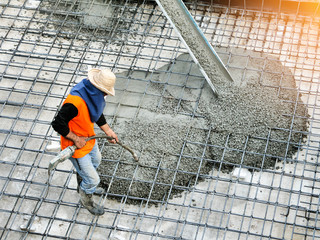Concrete Contractors are specialized professionals who build, construct and repair concrete structures. Concrete Contractors Dallas TX work on various projects, from foundations to floors to retaining walls and private driveways.

Concrete contractors have to make tough technical and business decisions. Membership helps them stay in the know and gives them access to support networks.
When you’re building something as massive as a home or office, it is important to ensure that the foundation is properly prepared before construction begins. This process, known as site work, is crucial to ensuring that the building will stand up to the elements and last for decades. The site preparation process includes a wide range of tasks, from clearing and leveling the land to installing utilities.
Surveying is an essential part of site work, as it determines the precise location for the foundation and maps out boundaries for the construction site. It also helps to settle any disputes over land ownership between adjacent properties. Once the surveyor has completed their work, excavation and grading can take place. This prepares the ground for the concrete foundation by removing any rocks, roots, or other debris and creating a flat uniform surface.
Before construction begins, the soil will undergo a series of tests to ensure that it is suitable for the type of structure being built. This testing will indicate whether the subsurface material can support the building’s weight and how well it absorbs water. If the soil is unsuitable, it will need to be removed and replaced with a different material.
Sitework also involves identifying any potential complications that could arise during construction. This allows contractors to address these problems before they become a problem and avoid costly mistakes that can delay the completion of the project.
Another benefit of proper site preparation is that it will make the building process easier for everyone involved. For example, if the building site is muddy, it will be difficult for workers to move around and transport materials. In addition, mud can get into everything, including tools and equipment. This can be problematic because it can lead to rust and other damage.
Finally, a properly prepared site will help to reduce the risk of accidents and injuries on the construction site. A muddy site can be slippery and dangerous for workers, especially when they are carrying heavy materials or climbing ladders. In addition, a muddy site can be difficult for trucks to drive on, which can cause delays and increase costs.
Formwork
Concrete contractors use formwork to mold the concrete into desired shapes and to support the wet concrete until it gains strength enough to support itself. It also controls how the concrete is poured and helps ensure that the concrete is positioned correctly. It can be temporary or permanent and can be constructed from wood, plywood, steel, plastic, fiberglass or a combination of materials. Formwork is often prefabricated in a factory and delivered to the job site as a series of panels with hardware like ties, wedges, clamps, braces and brackets that workers assemble on the construction site. This method can reduce the amount of time on-site and minimizes the labor required. Formwork can also be designed and built to a specification that meets the needs of the project.
Once the formwork is in place, workers prepare the concrete mixture and start pouring. It may be distributed by hand or through a pump connected to a concrete truck, which can help reach areas of the structure that can’t be reached on foot. Workers often use industrial vibrators to assist in the consolidation of the concrete and to eliminate air pockets. It is critical to monitor the progress of the concrete as it is poured, and formwork should be removed once the minimum curing time specified in the formwork design has been met or receipt of appropriate certification following concrete specimen testing.
The formwork process is a critical part of the construction of concrete structures and requires significant experience to produce quality results. It can be difficult to achieve the desired concrete consistency, shape and finish in a large structure with a conventional concrete mix, but modern concrete contractors are utilizing innovative techniques to improve the quality and efficiency of their work.
One such innovation involves the use of permanent insulated forms, which are assembled on site out of prefabricated fiberglass or plastic. These can offer advantages in terms of speed, strength, superior thermal and acoustic insulation, space to run utilities and integration of furring strips for cladding finishes. It is important for the Concrete Contractor to consult with a formwork supplier in the early stages of the design process to maximize the benefits of this technology.
Pouring
Concrete is one of the most commonly used materials in modern construction. It is highly durable, versatile, and affordable. It can be used for both interior and exterior surfaces. However, working with concrete requires a unique set of skills and knowledge. This is where the role of a concrete contractor comes into play. Concrete contractors are specialized subcontractors who handle all aspects of concrete construction, from mixing ingredients to building the structure to pouring and finishing the concrete.
The process begins with site preparation. This may include excavation and other ground preparation strategies that ensure the concrete pouring process goes smoothly. Forms are then built, typically with wood or pre-cast forms. For a concrete driveway or sidewalk, the forms will need to be at least 4″ thick. These forms are held in place with stakes driven into the ground every few feet. Concrete can also be poured into existing trenches or foundations to save on time and money.
During the concrete pouring phase, the concrete contractors will work with a mix supplier to ensure they have the correct mix for the project. This includes confirming the amount needed, identifying staging and washout areas, and ensuring that all equipment is onsite to finish the concrete pour. During the pour, many concrete contractors take pictures of the progress to help them remember what was done in case any issues arise in the future.
Once the concrete is poured, it will need to cure for at least two days. During this time, the concrete will need to be covered and protected from rain and other weather conditions. Concrete contractors will keep the general construction crew and the client updated on how long it will be before the concrete can be walked on or other work started on the project.
Once the concrete is fully cured, it can be removed from the forms. Smaller structures like driveways and sidewalks can be removed with a hammer and pry bar, while larger structures might require them to be carefully separated using a wedge or a pry bar. The concrete contractor will also clean up the area, removing any trash or other debris that may have ended up in the concrete during the curing process.
Finishing
Concrete work can be messy, but it’s worth the effort to get it right. Concrete contractors use a process called finishing, where they smooth and finish the freshly poured concrete. This step is critical, as it can determine the quality and durability of the concrete slab. It can also have a significant impact on the appearance of the finished project.
Concrete is the most widely used construction material in the world, and for good reason. It’s strong, versatile, and long-lasting. It can be used to build a wide variety of structures, from driveways and sidewalks to walls, bridges, and buildings. A concrete contractor’s job is to make sure that the concrete is poured correctly and that it has the strength needed for the project.
In order to do their job, a concrete contractor must be licensed, insured, and certified. They must also have worker’s compensation and liability insurance to protect themselves in case of an accident on the job. In addition, they need to have a solid understanding of local building codes and regulations to ensure that the project is completed properly.
Getting into the business of concrete contracting isn’t easy. Most successful concrete contractors begin their careers as laborers on a concrete crew and work their way up to the position of foreman or superintendent. Those who aren’t accepted into an apprenticeship program can still rise through the ranks by working hard and learning from their more experienced coworkers.
Once a concrete contractor has been trained, they can prepare the materials and mix the concrete needed for a project. However, it is becoming more common for them to outsource this responsibility to a ready mix plant. This allows them to focus on the more important aspects of their job.
Concrete contractors must have reliable suppliers, as they can’t complete a project without the concrete they need to pour. If a supplier can’t meet demand during a project, it can create huge delays. This is why many concrete contractors have relationships with multiple suppliers and schedule their orders ahead of time. This allows them to avoid costly delays in the middle of a project.
